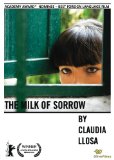| Reviews & Columns |
|
Reviews DVD TV on DVD Blu-ray 4K UHD International DVDs In Theaters Reviews by Studio Video Games Features Collector Series DVDs Easter Egg Database Interviews DVD Talk Radio Feature Articles Columns Anime Talk DVD Savant Horror DVDs The M.O.D. Squad Art House HD Talk Silent DVD
|
DVD Talk Forum |
|
|
| Resources |
|
DVD Price Search Customer Service #'s RCE Info Links |
|
Columns
|
|
|
Milk of Sorrow
Peruvian Academy Award nominee The Milk of Sorrow a/k/a La Teta Asustada is an earthy, and sometimes bizarre film. But it is also moving, subtle and quite beautiful. The reward is great for those with the patience to sit through it, but that patience is surely taxed.
The film opens with Fausta (Magaly Solier, in an almost deadpan but nonetheless riveting performance) singing to her mother at her deathbed. Songs are very important in Fausta's life. She sings about the pain of her life, of her fears, even about folk beliefs and mermaids. Fausta believes (as do others in Peru, in similar circumstances) that she has a peculiar ailment, passed on to her through her mother's milk. Her mother was gang raped while pregnant with Fausta, during a period of civil unrest. All the sorrows and pain she experienced passed on to Fausta, who now has recurrent nosebleeds and fainting spells. The more sophisticated people, including Fausta's doctor, think this is nonsense, but Fausta is constantly afraid of sexual assault, never going anywhere alone, and goes to very extreme lengths to prevent it from happening.
But Fausta's immediate problem is her mother's body. She wants desperately to bury her mother in her home village, and not in the yard of the home that she shares with her uncle (Marino Ballon) and his family in the big city. But moving the body costs money, which she doesn't have. Her aunt helps to get her a job working as a maid at the home of wealthy pianist Aida (Susi Sanchez) to pay the expenses. During her time working there, Fausta meets the gardener Noe (Efrain Solis), and perhaps begins to move toward having romantic feelings for him, if she can overcome her overpowering fear. She also develops something of a relationship with Aida, who seems genuinely interested in Fausta's music, but may have more self serving motives.
The Milk of Sorrow is very much about sorrow, and fear and neurosis and betrayal. But it is also about overcoming all of these things, even in dire circumstances. In the end, it is a very hopeful film. To get to that end one has to have a large supply of patience, as the film moves very slowly. This is a reflection of Fausta's character. She moves slowly, both through timidity and caution. She'll take a minute to cross a tiny room, and this is natural for her. A tighter edit would not have improved the film. Quite the opposite, it would have lessened its impact. Picking up the pace would have no benefit, but the viewer must take this into account. The gorgeous photography, though often of decrepit and desolate places, and the striking visual imagery help immensely. This is a beautiful film, made for quiet contemplation, full of deep symbolism (though what a burning piano symbolizes is an open question) and intuitive framing, all offering an insight into Fausta's mind which the reticent young woman would never give herself. She barely speaks. But the viewer's patience is rewarded. There is no simple dénouement that wraps everything up neatly and smites the wicked for their misdeeds, but the viewer is emotionally satisfied, if subtly. And the film is nothing if not subtle. Highly recommended.
The DVD
Video:
The image is presented in 1.78:1 widescreen, and looks good. The color palette covers a wide range, from dusty browns in the hills to smudgy grays in the slums and vivid reds and blues at the many weddings. All the colors are richly rendered, and every environment is shown with a gritty realism. This is a visually arresting film, with few if any flaws in the video.
Sound:
The sound is available in both Dolby digital 5.1 channel and 2 channel Spanish tracks, and sounds good. No hiss or other problems are apparent, the dialogue is always audible, and justice is done to the music that is so important to the film. No alternate language tracks are available, though English subtitles (which cannot be turned off) are included.
Extras:
No extras are included, which is a disappointment, as the thoughts of director Claudia Llosa about the origin of the film, and the process of filming in Peru, would have been quite interesting.
Final Thoughts:
The Milk of Sorrow is a subtle film, and to call it deliberately paced is a kindness. But it is very much worth the effort. The restrained performance of Magaly Solier is outstanding, and a nice counterpoint to the arresting imagery of the visuals. Claudia Llosa shows herself to be an accomplished filmmaker, who hopefully will continue to produce such worthwhile efforts in the future.
|
| Popular Reviews |
| Sponsored Links |
|
|
| Sponsored Links |
|
|
| Release List | Reviews | Shop | Newsletter | Forum | DVD Giveaways | Blu-Ray | Advertise |
|
Copyright 2024 DVDTalk.com All Rights Reserved. Legal Info, Privacy Policy, Terms of Use,
Manage Preferences,
Your Privacy Choices | |||||||













